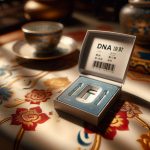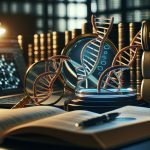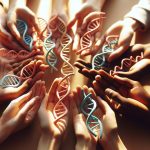STACS DNA offers cutting-edge solutions for tracking samples in both the forensic and healthcare sectors. Their technology is crucial for labs, agencies, and hospitals aiming to boost their efficiency, ensure transparency, and comply with regulations. We had the opportunity to speak with Dr. Hays Young and Malena Jimenez, experts in the field, who shared insights into the significant advantages of adopting STACS DNA. According to them, every lab dealing with forensic DNA should consider integrating these solutions into their operations.
The conversation revealed that implementing STACS DNA‘s technology not only streamlines workflow but also ensures that every sample can be traced throughout its journey in the laboratory environment. This level of accountability is essential for maintaining quality control and meeting stringent regulatory standards.
Furthermore, they emphasized how these sophisticated tracking systems could provide a substantial return on investment by reducing errors, saving time, and ultimately enhancing overall performance.
In conclusion, it’s clear from our discussion that any forensic DNA lab looking to stay ahead in terms of efficiency and compliance should seriously evaluate what STACS DNA has to offer. The benefits are undeniable – making it a worthwhile consideration for those committed to excellence in forensics or healthcare service delivery.
How STACS DNA software helps overcome issues in forensic DNA laboratories
Forensic DNA analysts often find themselves bogged down by repetitive tasks and extensive paperwork, leaving them less time for the core activity of DNA analysis. The introduction of STACS, however, is changing the game. By implementing a sophisticated barcode system, this technology streamlines the tracking of various lab elements including users, samples, consumables, and even equipment. This not only creates a comprehensive audit trail but also significantly cuts down on manual record-keeping.
As a result, analysts are now able to concentrate more on processing DNA samples rather than getting caught up in the mundane aspects of their work. This shift towards more efficient lab operations allows for heightened productivity and ensures that forensic experts can dedicate their efforts to what truly matters, solving cases with accuracy and speed. Through simplifying workflow processes in the lab, STACS is revolutionizing how forensic analyses are conducted, paving the way for advancements in the field.
What sets STACS DNA apart from others?
STACS DNA stands out in the forensic science field for a couple of standout reasons. For over two decades, they’ve been at the forefront of assisting DNA laboratories. Their expertise isn’t just about staying current; it’s about pioneering next-gen solutions like NGS, showing they really get what DNA analysis entails.
But that’s not all. What truly sets them apart is their approach to customer service. They go beyond merely handing over software with a pat on the back. They offer robust, adaptable solutions backed by comprehensive support services. Over a hundred customization projects under their belt testify to their commitment to meet client needs meticulously through dedicated project management, training sessions, and continuous help post-implementation.
Their strategy revolves around working hand-in-glove with clients, ensuring smoother transitions and effective change management. In essence, STACS DNA‘s blend of cutting-edge technology and personalized service redefines support in forensic science tech circles.
Did the COVID19 outbreak affect your job and change the company’s direction?
Our clientele mainly comprises forensic and public health laboratories, vital sectors that have tirelessly continued their operations amidst the pandemic. The services we provide play a pivotal role by enabling lab analysts and supervisors to efficiently work remotely. This adaptability ensures that, despite physical absence from the laboratory settings, the processing of cases and overall productivity remain uninterrupted. Our commitment lies in supporting these essential services to maintain their critical functions during challenging times.
Hays, can you describe your job as a Field Application Specialist at STACS DNA?
In my role, I engage deeply with both new and existing clients who use our forensic DNA database labs. My main goal is to fully grasp what they need, identify any challenges they’re facing, and figure out how our services can be tailored for them. This involves several key steps:
– Conducting demonstrations tailored for various user groups to showcase how our solutions work in real-life scenarios.
– Analyzing the current systems in place to find any gaps that might exist between what the lab needs and what it currently has.
– Writing down detailed requirements that capture exactly what a particular lab needs from our services.
– Providing thorough training for all end users, ensuring that everyone knows how to make the most of our system once it’s up and running.
By handling these tasks, I ensure that every implementation is successful right from the start.
How does past work at the Arkansas State Crime Lab help you now?
![]()
For nearly a decade, I had the privilege of serving as the DNA Technical Leader within both casework and databanking divisions at the Arkansas State Crime Laboratory. This role provided me with an invaluable perspective on how these sections operate, along with the chance to tackle various challenges they encountered. My experiences have been instrumental in bridging the gap between laboratory needs and our development team, enabling them to create software that aligns perfectly with laboratory expectations.
My hands-on experience in an actual lab setting has significantly enhanced my understanding of our clients’ requirements, ensuring their demands are fully satisfied. It’s my firm belief that including former forensic scientists like myself is a key ingredient in STACS DNA‘s formula for success. Their insights into real-world lab operations enable us to develop solutions that truly resonate with our users, contributing greatly to the company’s achievements in the field.
Before working at STACS DNA, Malena was a Criminalist for the Missouri State Highway Patrol’s Crime Lab. How did the STACS software help her in that job?
Before the introduction of STACS Casework, the process of tracking consumables, documenting instrument maintenance, and recording processing details relied heavily on manual entries into log books. This often tedious task not only consumed a significant amount of time but also increased the potential for human error. However, with the adoption of STACS Casework, these activities saw a dramatic transformation. The software’s ability to automatically manage these processes meant that analysts could dedicate more time to interpreting profiles rather than getting bogged down in routine checks and validations.
The impact of STACS Casework extended beyond just simplifying internal operations; it also enhanced collaboration across the Missouri State Highway Patrol’s DNA laboratories scattered throughout the state. The centralized system allowed administrators to effortlessly oversee caseloads at different sites and reallocate cases as necessary. This newfound ease in sharing work and information between locations helped prevent deviations from standard operating procedures (SOPs) and facilitated a seamless exchange of knowledge among analysts, ensuring consistency in their work.
Moreover, liaising with external agencies and managing audits became significantly easier thanks to STACS Casework. Gone were the days when preparing for an audit meant drowning in paperwork; now all required data could be accessed digitally and shared electronically with auditors or other interested parties ahead of time. Audits themselves became smoother operations, with demonstrations on how to retrieve information from STACS Casework replacing physical piles of documentation.
One particularly noteworthy feature was how discovery requests were handled by automatically compiling all relevant processing information into one compressed file—streamlining what used to be a cumbersome process. Additionally, while STACS Casework came preloaded with various reports useful for internal management purposes, its dynamic query builder tool offered labs the flexibility to dig deeper into their data whenever needed, making it simpler than ever to respond promptly and thoroughly to informational requests.
In essence, adopting STACS Casework has revolutionized how Missouri’s DNA laboratories operate — minimizing manual efforts, fostering better communication between sites, smoothing over auditing processes, and enabling quick access to comprehensive data analysis tools.
Track-Kit by STACS DNA simplifies the process of monitoring
Track-Kit revolutionizes the way samples, including sexual assault kits, are monitored as they journey through various facilities. This online platform ensures that no time is lost and accountability is maintained at every stage. It stands out by offering tailored access to different users such as survivors, medical centers, labs, and law enforcement agencies. These stakeholders can monitor the progress of these kits in real-time and are alerted if there’s any hitch in meeting deadlines.
What truly sets Track-Kit apart is its commitment to empowering survivors. In times past, victims were often left in the dark regarding the status of their evidence kits. Now, through this system, they’re kept informed every step of the way – a significant stride towards respecting and acknowledging their need for closure and justice.
In essence, Track-Kit‘s versatility in tracking any sample type coupled with its user-friendly portals for all involved parties make it an indispensable tool in streamlining processes that are crucial for timely justice and accountability.
Survivors can track the progress and location of their sexual assault kits while their privacy is protected
In collaboration with organizations dedicated to assisting survivors, a vital tool named Track-Kit has been developed. This initiative places a strong emphasis on maintaining the confidentiality and security of individuals who have experienced sexual assault. When a survivor undergoes an examination at a healthcare facility, they are provided with a special code by a qualified nurse specializing in sexual assault cases. This code is devoid of any personal information, ensuring the individual’s privacy.
The interface that survivors engage with is intentionally designed without any branding to maintain discretion and includes an option for immediate exit should the need arise, reinforcing its commitment to user safety. Furthermore, it does not store any login data, enhancing privacy protection.
Additionally, Track-Kit serves as more than just a tracking tool; it acts as an informational hub offering access to local support services related to sexual assault. These resources are made available in various languages, ensuring accessibility for users from diverse backgrounds. This thoughtful approach underlines the system’s dedication not only to providing practical solutions but also emotional support and valuable information for those navigating through these challenging times.
What trends and technologies will become more common in the future?
In the near future, groundbreaking shifts and innovations are expected to emerge. A significant focus will be on enhancing our ability to extract comprehensive data from tiny DNA samples. This push is anticipated to lead to advancements in Massive Parallel Sequencing, making it more affordable and accessible for widespread application.
Moreover, professionals in forensic DNA analysis will prioritize refining methods for interpreting complex mixtures of DNA. Their goal is clear: minimize biases and mistakes that could cloud results. These developments promise a transformative impact on how we harness genetic information, shaping a future where precision and accuracy take center stage in scientific inquiries and applications related to genetics.



















